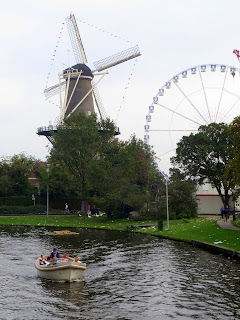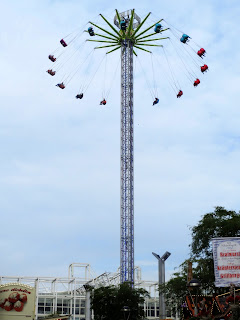October the third is a very big festival in Leyden. As during
Carnival in the south of the Netherlands, shops are closed, the town is
converted into a big fairground, traffic has no access at all to the town for a
week. To give it a semblance of a real commemoration, of happiness and
thankfulness because of the liberation from the Spaniards in 1574, there is a
church service as well. This is one of the most stylish parts of the
festivities. It is attended by VIPs, a well-known person, a politician or a former
chaplain, may be the speaker, the Military Band will play inside the church,
there will be a choir, and newly composed songs about Leyden as a fantastic
city will be sung. It is one of the few parts of the celebrations where town
and university, which were always strictly separated, join forces.
The harbour for historic ships, the "Galgewater"
When I was a
first year student, the lectures would start after October 3rd and
we were strictly forbidden to stay in town and join in the festivities on penalty
of being thrown into one of the canals if we did. So we avoided town that first
year and of course didn’t realise that meanwhile the older students were making
merry! It was a feast for the local population, mainly labourers, who saved
money the entire year to spend it all during the three days of October 3rd.
They spend it on booze, food and the fairground. I don’t know how many years
this church service has been part of the festivities. I did not attend one till
late in life, when I was no longer working fulltime, and never as a student. The
first time I attended it was a modest affair, the church not packed at all.
After the service the guests of honour, the choirmaster and locals politicians
will be invited to share a meal of “Leyden stew”, a variety of Irish stew, made
of meat, unions, carrots and potatoes. It is said that such a stew still
hanging over a fire was found by a boy when the Spaniards had hastily fled
their positions around the city walls of Leyden, defeated by the inundated
fields.
The Old Rhine, almost black and white in the early morning mist
For three full days Leyden will smell of the stew, and anybody
who fancies it can share a communal, al fresco meal on long tables after acquiring
a ticket.
Very early in the morning at the Weigh house herring and
white bread are distributed among the local inhabitants who form very long queues
awaiting their turn.
In the afternoon there is a pageant of floats crawling through
Leyden. Each year there is another theme. It might be historical, or something
to do with the town itself, or perhaps environmental problems or solutions. As
students we would hang out of the window of one of our friends digs who was so
lucky as to live in a street where the parade would pass, drinking coffee and
eating cakes. Or perhaps even cheap wine out of cartons, the so called Chateau
Migraine, which we wouldn’t easily forget the next day! I only remember that
the floats seemed to be made of cheap carton and were rather rickety and very
amateurish, as if put together by adult nursery school pupils. Also there were
many big gaps between the floats and the brass bands, so it all took a lot of
time. We couldn’t cycle back “mid-parade” to our own digs as the roads would be
closed off, even for bicycles. I haven’t seen the floats since. They might be
more professional now. But it is far too crowded, which I do not like.
The "Rapenburg" and the tower of the Academy, the main building of the University of Leyden, in the distance
Early in the morning I walked to the big “Pieterskerk”.
Leyden looked mysterious and fresh in the morning mist, the mist of autumn
promising a warm and sunny day. It was still very quiet, people probably taking
it easy after a night of drinking and feasting, a night with fireworks and the expensive
and scary attractions of the fair ground. It was Leyden at its best. The many
booths and stalls selling a variety of food and merchandise were not open yet.
It was bliss.
Well known buildings on the Rapenburg
The church was absolutely packed, with even people standing
or sitting on the stone floor. The military brass band played beautifully and
the “sermon” was to the point and very appropriate in this time of war and the
influx of all those refugees, fleeing their war torn countries and trying to
find safety and happiness for themselves and their children.
Al fresco cafe on a bridge, and the big mill plus the temporary ferris wheel
After the service, I had a coffee in the centre of town and
was amazed at how filthy the town was. I had to wade through a carpet of
plastic rubbish, plastic glasses, bottles, tins, wrappers and cartons of French
fries etc. At the Weighing House where the herring and bread had been
distributed they were trying to brush the slippery innards of the herrings into
the canal. It was a rather slimy and smelly place! The stalls lining the
streets were now open and the fairground in full swing. Buggies, children,
balloon sellers, ice cream vendors, they were all there in droves. The variety
of food was mind boggling: fried and smoked fish, smoked eel on white buns,
burgers, ice cream, spun sugar, sweets, French fries, cakes, the stalls interspersed
with booths selling handbags, smartphone covers, sunglasses, soft toys and much
more superfluous merchandise. I escaped to my own blissfully quiet and sunny
back garden
Too many people!
Too much rubbish!
Nice plant containers?
High over Leyden Station













No comments:
Post a Comment